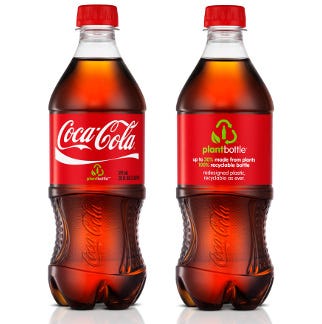Coca-Cola speeds up global production of its PlantBottle
January 30, 2014

Coke PlantBottle Pkg
The Coca-Cola Co. has announced a partnership with JBF Industries Ltd. to further expand production of the plant-based material used in the company's PlantBottle packaging. The supply partnership will help Coca-Cola continue its leadership in bringing renewable, lower-carbon plastics to the marketplace and move the company closer to its target of using PlantBottle packaging technology in all of its plastic bottles by 2020.
Ronald Lewis, vp, procurement and chief procurement officer at The Coca-Cola Co. says, "The benefits of sustainable innovation are only fully realized when commercialized and put in the hands of consumers. In 2009, we introduced the world to our PlantBottle package—the first recyclable PET plastic bottle made partially from plants. Today, Coca-Cola has sold more than 10 billion PlantBottle packages around the world that are less dependent on petroleum and have a lower carbon impact. We are pleased that our partnership with JBF Industries Ltd. will help us further expand global production."
To support this partnership, JBF Industries Ltd. will build the world's largest facility to produce bio-glycol—the key ingredient used to make PlantBottle packaging. The facility, which will be located in Araraquara, Sao Paulo, Brazil, will produce the ingredient using locally sourced sugarcane and sugarcane processing waste. Both materials meet The Coca-Cola Co.'s established sustainability criteria used to identify plant-based ingredients for PlantBottle packaging. These guiding principles include demonstrating improved environmental and social performance as well as avoiding negative impacts on food security.
Construction on the new facility is expected to begin at the end of this year and last for 24 months. At full capacity, it is estimated the facility will produce 500,000 metric tons of material per year. By using plant-based materials instead of non-renewable materials, the facility will remove the equivalent of 690,000 metric tons of carbon dioxide or the equivalent of consuming more than 1.5 million barrels of oil each year.
Lewis joined Geraldo Alckmin the Governor of Sao Paulo, Brazil; Marcelo Barbieri, Araraquara Mayor; Cheerag Arya, Chief Executive Officer of JBF Industries Ltd. and Xiemar Zarazúa, President of The Coca-Cola Co.'s Brazil Business Unit, at Bandeirantes Palace in Sao Paulo to announce the partnership.
PlantBottle packaging is available in more than 24 countries worldwide and across a variety of Coca-Cola products. Since the package launched in 2009, its use has eliminated the equivalent of almost 100,000 metric tons of carbon dioxide emissions—the equivalent of 200,000 barrels of oil from The Coca-Cola Co.'s PET plastic packaging.
See a video here of the PlantBottle in production.
Source: The Coca-Cola Co.
.
About the Author(s)
You May Also Like


